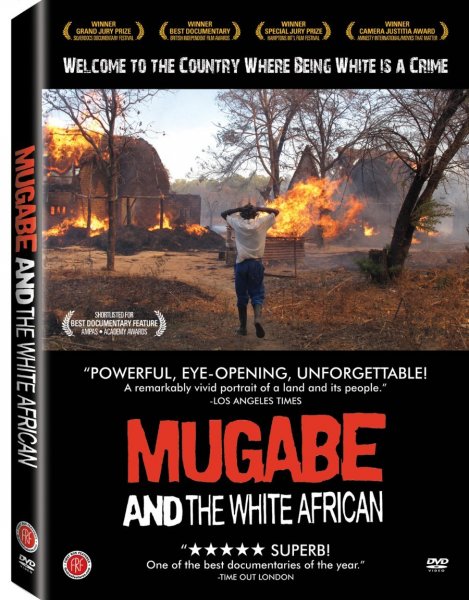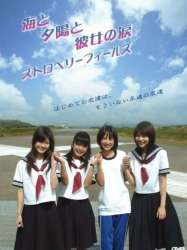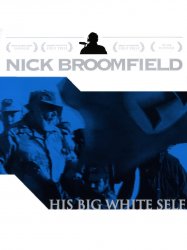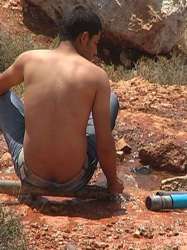Mugabe and the White African is a British film of genre Documentary released in USA on 7 august 2009
Mugabe and the White African (2009)

If you like this film, let us know!
- Infos
- Casting
- Technical infos
- Photos
- Videos
- Film quotes
- Characters
- Music
- Awards
Released in USA 7 august 2009
Length 1h30
OriginUnited-kingdom
Genres Documentary
Themes Films set in Africa, Environmental films, Films about racism, Documentary films about business, Documentary films about racism, Documentary films about law, Documentary films about environmental issues, Documentaire sur une personnalité, Documentary films about politics, Political films
Rating76%










Mugabe and the White African is a 2009 documentary film by Lucy Bailey and Andrew Thompson. The film documents the lives of a white Zimbabwean family who run a farm in Chegutu, as they challenge the Fast Track land redistribution programme that redistributed white-owned estates, a legacy of colonialism and UDI, beginning in 2000. The film follows Mike Campbell, his son-in-law Ben Freeth, and their family as they challenge Robert Mugabe and the Zimbabwean government before the Southern African Development Community tribunal for racial discrimination and human rights violations. The film premiered in the UK on 21 October 2009 at the London Film Festival.
^ Bell, Alex (25 June 2009). "Zimbabwe: Documentary on Chegutu Land Fight Wins International Award". AllAfrica.com. SW Radio Africa. Retrieved 4 August 2009.
^ de Castella, Tom (21 October 2009). "Betting the farm against Mugabe". BBC News Online Magazine. BBC. Retrieved 26 October 2009.
Synopsis
En 2008, Mike Campbell – l’un des derniers fermiers blancs au Zimbabwe face au violent programme de réforme agraire – prend le risque sans précédent d’attaquer le Président Robert Mugabe devant le tribunal du SADC (Communauté de Développement Sud-Africain) afin de défendre ses droits. Son exploitation agricole emploie plus de 500 travailleurs et abrite également leurs familles. Mike Campbell accuse Mugabe et son gouvernement de discrimination raciale et de violation des Droits de l’Homme. Embarqués dans un procès hors du commun, Mike et sa famille vont devoir faire face à la violence et à la cruauté du régime du dictateur. Ce documentaire retrace leur combat.Comments
Leave comment :
Suggestions of similar film to Mugabe and the White African
There are 8969 with the same cinematographic genres, 11859 films with the same themes (including 0 films with the same 10 themes than Mugabe and the White African), to have finally 70 suggestions of similar films.If you liked Mugabe and the White African, you will probably like those similar films :

Strawberry Fields (2006)
, 1hOrigin Israel
Genres Drama, Documentary, Fantasy
Themes Films set in Africa, Environmental films, Films about religion, Documentary films about business, Documentary films about law, Documentary films about environmental issues, Documentary films about war, Documentary films about historical events, Documentaire sur une personnalité, Documentary films about politics, Documentary films about religion, Political films, Films about Jews and Judaism
Actors Mitsuki Tanimura, Yuria Haga
Rating64%





Strawberry Fields points out that strawberries grown in Gaza are the only agricultural product marketed internationally as being of Palestinian origin. One of the major Gaza strawberry farms in located at Beit Lahiya. More than 1,500 tons of strawberries are exported from Gaza to Europe through the Israeli company Agrexco. In order to get overseas, however, the fruits need to pass through the checkpoint that separates Israel and Gaza. The 2005–2006 growing season coincided with the Israel's disengagement from Gaza and the rise of Hamas as the ruling political entity. The armed conflict between Israel and Hamas resulted in the closing of the border checkpoint. The strawberries grown at Beit Lahiya cannot leave Gaza, resulting in significant losses for the farmers and their Agrexco partners. Unable to transport their produce, the farmers have no choice but to dispose of their crop and prepare for the following year’s growing season.

Rwanda pour mémoire (2003)
, 1h8Directed by Samba Félix Ndiaye
Origin France
Genres Documentary
Themes Films set in Africa, Films about writers, Films about racism, Documentary films about racism, Documentary films about law, Documentary films about war, Documentary films about historical events, Documentaire sur une personnalité, Documentary films about politics, Political films
In 1994, between April and July, the massacre of Tutsis and moderate Hutus left one million dead. Instigated by Fest’Africa, a dozen African authors met four years after the events as writers in residence at Kigali, to try to break the silence of African intellectuals on this genocide.

Screamers (2006)
, 1h29Origin USA
Genres Documentary
Themes Films set in Africa, Films about racism, Documentary films about racism, Documentary films about law, Documentary films about war, Documentary films about historical events, Documentaire sur une personnalité, Documentary films about politics, Political films
Actors Shavo Odadjian
Rating58%






My Neighbor, My Killer (2009)
, 1h20Directed by Anne Aghion
Origin France
Genres Documentary
Themes Films set in Africa, Films about racism, Documentary films about racism, Documentary films about law, Documentary films about war, Documentary films about historical events, Documentaire sur une personnalité, Documentary films about politics, Political films
Rating75%






His Big White Self (2006)
, 1h25Directed by Nick Broomfield
Genres Documentary
Themes Films set in Africa, Films about racism, Documentary films about racism, Documentary films about law, Documentaire sur une personnalité, Documentary films about politics, Political films
Actors Nick Broomfield
Rating68%






Sea Point Days (2008)
, 1h36Origin South africa
Genres Documentary
Themes Films set in Africa, Films about racism, Documentary films about racism, Documentary films about law, Documentaire sur une personnalité, Documentary films about politics, Documentary films about cities, Political films
Rating68%





Alongside the southernmost urban centre in Africa, separating city from ocean, lays a very special strip of land. Set against the beautiful backdrop of the Atlantic Ocean on one side and Signal Hill on the other, the Sea Point Promenade – and the public swimming pools in its centre – forms a space unlike any in Cape Town. Once a bastion of Apartheid exclusivity, it is nowadays unique in its apparently easy mix of age, race, gender, religion, wealth status and sexual orientation. Somehow this space has become one where all South Africans feel they have a right to exist, and where the possibility of happiness in a divided world doesn't seem unfeasible. But what is the reality of those coming here? How do people see their past, their present in this space and their future in this country?

Interrupted Streams (2010)
, 1h15Origin Israel
Genres Documentary
Themes Films set in Africa, Environmental films, Films about religion, Documentary films about law, Documentary films about environmental issues, Documentary films about war, Documentary films about historical events, Documentaire sur une personnalité, Documentary films about politics, Documentary films about religion, Political films, Films about Jews and Judaism
Paths of lives are crossed in one village in the West Bank. Along the broken water pipelines, villagers walk on their courses towards an indefinite future. Israel that controls the water, supplies only a small amount of water, and when the water streams are not certain nothing can evolve. The control over the water pressure not only dominates every aspect of life but also dominates the spirit. Bil-in, without spring water, is one of the first villages of the West Bank where a modern water infrastructure was set up. Many villagers took it as a sign of progress, others as a source of bitterness. The pipe-water was used to influence the people so they would co-operate with Israel’s intelligence. The rip tore down the village. Returning to the ancient technique of collecting rainwater-using pits could be the villagers’ way to express independence but the relations between people will doubtfully be healed.

As We Forgive (2008)
Genres Documentary
Themes Films set in Africa, Films about racism, Documentary films about racism, Documentary films about law, Documentary films about war, Documentary films about historical events, Documentaire sur une personnalité, Documentary films about politics, Political films
The film tells the story of two Rwandan women who come face-to-face with the neighbors who slaughtered their families during the 1994 genocide, and their personal journeys toward forgiveness. Featuring in-depth interviews with both survivors and murderers, As We Forgive provides an intimate, first-hand view of the encounters between genocide perpetrators and their victims’ families.

Voices of Sarafina! (1988)
, 1h25Directed by Nigel Noble
Origin USA
Genres Documentary
Themes Films set in Africa, Films about racism, Documentary films about racism, Documentary films about law, Documentaire sur une personnalité, Documentary films about politics, Political films
Actors Leleti Khumalo
Rating65%





 , 1h
, 1hDirected by Andrew Goldberg
Origin USA
Genres Documentary
Themes Films set in Africa, Films about racism, Films about religion, Documentary films about racism, Documentary films about law, Documentary films about war, Documentary films about historical events, Documentaire sur une personnalité, Documentary films about politics, Documentary films about religion, Political films, Films about Jews and Judaism
Rating67%





 Connection
Connection